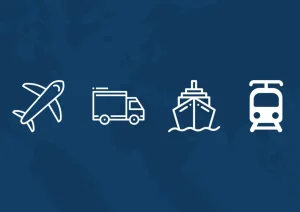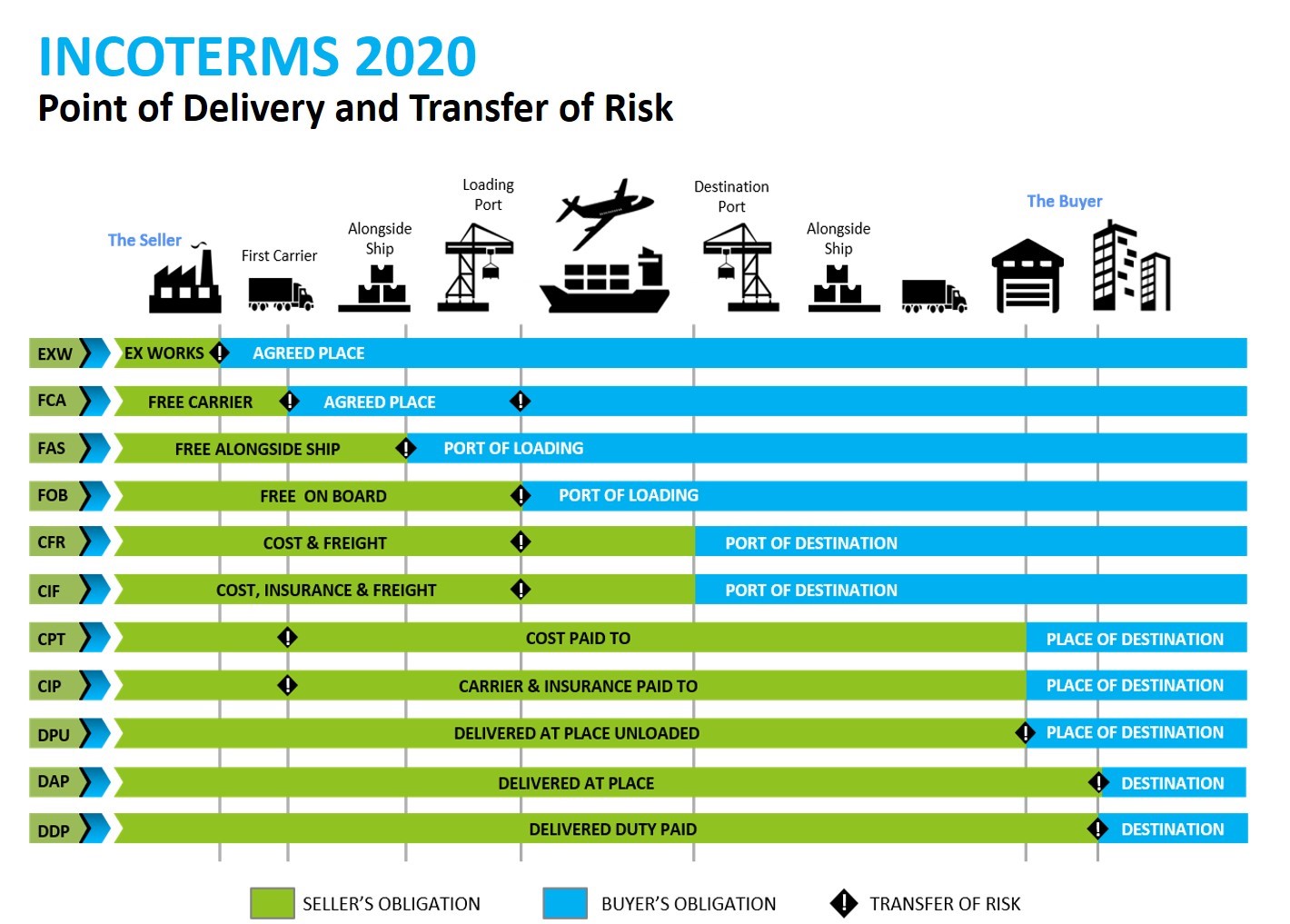[vc_row][vc_column][vc_column_text css=”.vc_custom_1554725850153{margin-bottom: 0px !important;}”]
In international trade, Incoterms 2020 (International Commercial Terms) are essential for defining the roles and responsibilities of buyers and sellers. These standardized rules set expectations for shipping costs, risks, and logistics, ensuring a smoother flow across borders. If you’re new to global shipping or want to stay updated on the latest terminology, understanding Incoterms 2020 is crucial for success.
In this article, we’ll explain Incoterms 2020, break down each key term, and discuss how these terms can help businesses manage their logistics more effectively.
What Are Incoterms?
Incoterms are a set of internationally recognized rules that define the responsibilities of buyers and sellers to deliver goods. Published by the International Chamber of Commerce (ICC), these terms ensure that both parties are on the same page regarding shipping procedures, risks, insurance, and customs clearance.
Incoterms 2020 came into effect on January 1, 2020, and they address key shipping concerns like the transfer of risk, transportation costs, and responsibility for goods at various transit points. Using the appropriate Incoterm, both the buyer and seller can avoid confusion and ensure a more efficient international shipping process.
[/vc_column_text][dt_sc_empty_space margin_lg=”30″ margin_md=”” margin_sm=”” margin_xs=”” el_id=”1554726233426-12dc6c7c-93ff”][vc_column_text css=”.vc_custom_1554725367887{margin-bottom: 0px !important;}”]
Why Are Incoterms Important?
- Clear Definition of Responsibilities: Incoterms help businesses understand their responsibilities at every stage of the shipping process, from delivery to customs.
- Risk and Cost Management: By clearly outlining who is responsible for what, Incoterms minimizes the risk of unexpected costs or delivery delays.
- Global Trade Standardization: With businesses across different countries using the same terminology, Incoterms streamline international transactions and facilitate smoother operations.

Incoterms 2020 Terms
11 Incoterms 2020 rules are grouped into two categories: terms for any mode of transport and terms for sea or inland waterway transport. Below is an overview of these essential Incoterms, which are crucial for global shipping.
Incoterms for Any Mode of Transport
- EXW (Ex Works)
The EXW Incoterm places the minimum responsibility on the seller, who only makes the goods available for pick-up at their premises or another agreed location. The buyer is responsible for transportation, customs, and delivery costs from that point forward. - FCA (Free Carrier)
Under FCA, the seller delivers the goods to a carrier at an agreed location. From that point onward, the buyer assumes responsibility for shipping, insurance, and costs. - CPT (Carriage Paid To)
In CPT, the seller covers the transportation costs to a specified destination. However, risk transfers to the buyer as soon as the goods are handed over to the carrier. - CIP (Carriage and Insurance Paid To)
Similar to CPT, in CIP, the seller also arranges and pays for insurance for the goods during transit, providing the buyer with additional security. - DAP (Delivered at Place)
Under DAP, the seller delivers the goods to a specific location, ready for unloading. The buyer is responsible for customs clearance and unloading costs. - DPU (Delivered at Place Unloaded)
DPU (formerly DAT) means the seller is responsible for delivering and unloading the goods at a specified location. The buyer is responsible for final importation and duties. - DDP (Delivered Duty Paid)
With DDP, the seller takes full responsibility for all costs, risks, and duties, delivering the goods to the buyer’s door, including paying for customs duties and taxes.
Incoterms for Sea or Inland Waterway Transport
- FAS (Free Alongside Ship)
The FAS term means the seller delivers the goods alongside the ship at the port of shipment. The buyer assumes responsibility for loading, shipping, and all costs after that point. - FOB (Free on Board)
Under FOB, the seller delivers the goods on board the vessel, and the risk transfers to the buyer once the goods are loaded. The buyer is responsible for shipping and insurance costs from that point. - CFR (Cost and Freight)
With CFR, the seller pays for transportation costs to the destination port, but the risk passes to the buyer once the goods are loaded on the vessel. - CIF (Cost, Insurance, and Freight)
CIF is similar to CFR, but the seller also provides insurance for the goods during transit. Risk is transferred to the buyer once the goods are loaded onto the ship.

[/vc_column_text][dt_sc_empty_space margin_lg=”30″ margin_md=”” margin_sm=”” margin_xs=”” el_id=”1554787288147-413ef597-f37d”][vc_column_text css=”.vc_custom_1554725367887{margin-bottom: 0px !important;}”]
How to Choose the Right Incoterm for Your Shipment
Choosing the right Incoterm is essential for minimizing costs and risks in international shipping. Factors to consider when choosing an Incoterm include:
- Cost of transport: Evaluate who is better positioned to handle transportation costs. Some Incoterms, such as EXW, shift most costs to the buyer, while DDP places them on the seller.
- Risk tolerance: Determine how much risk each party is willing to assume during the shipment process. For instance, FOB transfers risk to the buyer once goods are loaded onto the vessel.
- Import/export regulations: Check the regulations in both the exporting and importing countries. Some nations may have restrictions or special requirements for customs clearance.
- Customs clearance responsibilities: Decide whether the buyer or seller will manage customs formalities. Complex customs procedures may favor Incoterms like DPU or DDP, where the seller oversees these aspects.
- Mode of transport (air, sea, road): Consider whether the shipment will travel by air, sea, rail, or road. Incoterms like FOB and CIF are exclusive to maritime transport, while CPT and CIP are versatile across all modes.
Conclosion
For more information on shipping and logistics, be sure to check out our other helpful resources on shipping and freight terms and customs clearance, and feel free to contact us if you need help choosing the best mode of transportation or the most effective terms for your contracts.
[/vc_column_text][dt_sc_empty_space margin_lg=”30″ margin_md=”” margin_sm=”” margin_xs=”” el_id=”1554725946564-2818fde8-7bec”][/vc_column][/vc_row]
Contributor comment.
Approved Contributor comment.
test